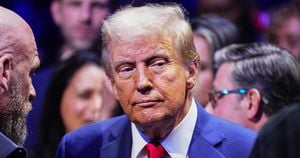On November 24, 2024, marked by enthusiasm and anticipation, the citizens of Uruguay made their way to the polls to participate in the presidential runoff election, which would determine the direction of the country amid rising economic and social challenges.
Yamandú Orsi, the candidate from the leftist Broad Front coalition, emerged victorious against Álvaro Delgado, representing the right-leaning National Party, marking the return of the Broad Front to power after facing five years of conservative governance. With 100% of the votes counted, Orsi and his running mate, Carolina Cosse, scored 49.84% of the votes — 1,196,789 ballots — compared to Delgado's 45.86%, which amounted to 1,101,296 votes.
The electoral process saw remarkable participation, with around 89% of Uruguay's 2.7 million eligible voters casting their ballots. This turnout highlighted the citizens' deep engagement with the democratic process, as many were disillusioned by issues such as rising crime rates and economic instability, which has plagued the country.
Leading up to the election, predictions were mixed. Many analysts were skeptical about the Broad Front's chances, recalling the previous election when the right-wing National Party successfully garnered support from other political factions. Yet, persuasion was key this time around. Orsi’s social democratic rhetoric focused on reinforcing public institutions and addressing pressing social issues, eventually swaying voters away from Delgado’s neoliberal proposals, which many viewed as extensions of the unpopular policies of former President Luis Lacalle Pou.
Upon concluding the results, Lacalle Pou congratulated Orsi on his victory, signaling the beginning of the transition period. “I called Yamandú Orsi to congratulate him as President-elect of our country and to position myself at his disposal to begin the transition as soon as I deem it appropriate,” he stated. Orsi reciprocated the gesture by calling for unity among the divided political factions, advocating for cooperation among Uruguayans to build a balanced nation.
This election came with its share of immediate effects on regional dynamics, as many leftist leaders across Latin America celebrated Orsi's victory. Brazil's President Lula da Silva hailed the win as beneficial for the entirety of Latin America, reaffirming commitments to regional cooperation and social justice.
“This is victory for the whole of Latin America and the Caribbean. Brazil and Uruguay will continue to work together in Mercosur and other forums for sustainable development,” said Lula, signaling how politically significant this win extends beyond Uruguay's borders.
While the election results were celebrated, they reflect broader sentiments of discontent with current political and economic conditions throughout the region. The recent rise of progressive leaders has been seen as indicative of changing attitudes among Latin American voters, who increasingly prefer candidates who promise more inclusive and welfare-focused policies.
Orsi, who has often been regarded as the political heir to former President José Mujica, faces the monumental task of guiding Uruguay through current challenges, including heightened crime rates and economic strains exacerbated by inflation. His campaign promises focused on addressing homelessness, poverty, and increasing security whilst also promoting economic growth without significantly raising taxes.
His plans incorporate comprehensive community-based crime prevention strategies along with measures aimed at advancing economic investments. The election underscored the rise of crime as the primary concern among voters, particularly as homicide rates have surged due to shifts in cocaine trafficking routes within the region, causing widespread alarm.
With his plans to review the pensions infrastructure and expand grants targeting child poverty — which affects approximately 25% of the youth population — Orsi’s administration aims to cultivate tangible improvements within pressing social issues. The mixed audiences and differing views among the populace will undoubtedly shape his approach toward governance as he repeats calls for national dialogue.
“I will be the president who calls for national dialogue again and again, who builds a more integrated society and country,” Orsi declared, envisioning the kind of administration he aspires to lead, countering the backdrop of division and disparity among the electorate.
Born on June 13, 1967, Orsi grew up on a vineyard farm and became heavily involved with the People’s Participation Movement during the military dictatorship from 1973 to 1983. His political awakening was significantly influenced by the tumultuous backdrop of those years. His experience as both mayor and history teacher molded his perspective on governance and public service.
Despite Orsi's charm and relatability, some critics noted his campaign lacked clear, actionable plans for governance, leading to doubts about how effectively he could mobilize support and implement his ambitious agenda. Nevertheless, his down-to-earth personality has earned him praise as he enjoys traditional Uruguayan customs, such as sharing mate tea and walking his dog, which endear him to many constituents.
Overall, Orsi's return signals not only potential changes for Uruguay domestically but also signifies the possibility of more progressive governance throughout Latin America. The deep-seated desires of the populace for social justice and economic stability imply strategic challenges and opportunities for the new administration.
The atmosphere surrounding the election results is reminiscent of previous shifts within Latin American politics where discontent with traditional political frameworks often pushes voters to favor leftist policies. Orsi and Cosse's administration will assume office on March 1, 2025, bringing with them hopes for renewed social democracy within the country and the region at large.



